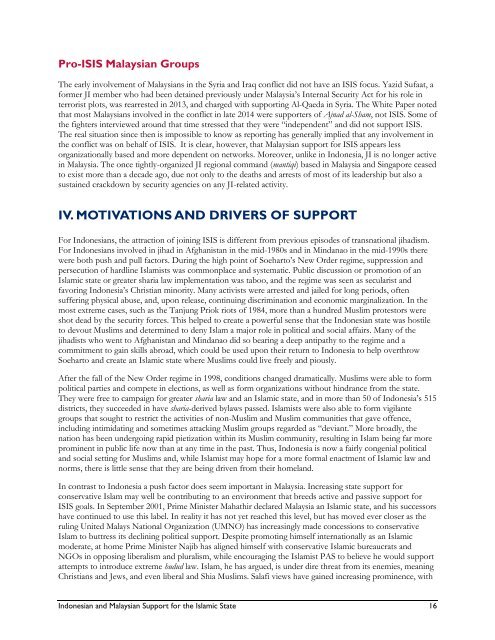INDONESIAN AND MALAYSIAN SUPPORT FOR THE ISLAMIC STATE (FINAL REPORT)
CVE_IndonesianMalaysianSupportforISIS
CVE_IndonesianMalaysianSupportforISIS
You also want an ePaper? Increase the reach of your titles
YUMPU automatically turns print PDFs into web optimized ePapers that Google loves.
Pro-ISIS Malaysian Groups<br />
The early involvement of Malaysians in the Syria and Iraq conflict did not have an ISIS focus. Yazid Sufaat, a<br />
former JI member who had been detained previously under Malaysia’s Internal Security Act for his role in<br />
terrorist plots, was rearrested in 2013, and charged with supporting Al-Qaeda in Syria. The White Paper noted<br />
that most Malaysians involved in the conflict in late 2014 were supporters of Ajnad al-Sham, not ISIS. Some of<br />
the fighters interviewed around that time stressed that they were “independent” and did not support ISIS.<br />
The real situation since then is impossible to know as reporting has generally implied that any involvement in<br />
the conflict was on behalf of ISIS. It is clear, however, that Malaysian support for ISIS appears less<br />
organizationally based and more dependent on networks. Moreover, unlike in Indonesia, JI is no longer active<br />
in Malaysia. The once tightly-organized JI regional command (mantiqi) based in Malaysia and Singapore ceased<br />
to exist more than a decade ago, due not only to the deaths and arrests of most of its leadership but also a<br />
sustained crackdown by security agencies on any JI-related activity.<br />
IV. MOTIVATIONS <strong>AND</strong> DRIVERS OF <strong>SUPPORT</strong><br />
For Indonesians, the attraction of joining ISIS is different from previous episodes of transnational jihadism.<br />
For Indonesians involved in jihad in Afghanistan in the mid-1980s and in Mindanao in the mid-1990s there<br />
were both push and pull factors. During the high point of Soeharto’s New Order regime, suppression and<br />
persecution of hardline Islamists was commonplace and systematic. Public discussion or promotion of an<br />
Islamic state or greater sharia law implementation was taboo, and the regime was seen as secularist and<br />
favoring Indonesia’s Christian minority. Many activists were arrested and jailed for long periods, often<br />
suffering physical abuse, and, upon release, continuing discrimination and economic marginalization. In the<br />
most extreme cases, such as the Tanjung Priok riots of 1984, more than a hundred Muslim protestors were<br />
shot dead by the security forces. This helped to create a powerful sense that the Indonesian state was hostile<br />
to devout Muslims and determined to deny Islam a major role in political and social affairs. Many of the<br />
jihadists who went to Afghanistan and Mindanao did so bearing a deep antipathy to the regime and a<br />
commitment to gain skills abroad, which could be used upon their return to Indonesia to help overthrow<br />
Soeharto and create an Islamic state where Muslims could live freely and piously.<br />
After the fall of the New Order regime in 1998, conditions changed dramatically. Muslims were able to form<br />
political parties and compete in elections, as well as form organizations without hindrance from the state.<br />
They were free to campaign for greater sharia law and an Islamic state, and in more than 50 of Indonesia’s 515<br />
districts, they succeeded in have sharia-derived bylaws passed. Islamists were also able to form vigilante<br />
groups that sought to restrict the activities of non-Muslim and Muslim communities that gave offence,<br />
including intimidating and sometimes attacking Muslim groups regarded as “deviant.” More broadly, the<br />
nation has been undergoing rapid pietization within its Muslim community, resulting in Islam being far more<br />
prominent in public life now than at any time in the past. Thus, Indonesia is now a fairly congenial political<br />
and social setting for Muslims and, while Islamist may hope for a more formal enactment of Islamic law and<br />
norms, there is little sense that they are being driven from their homeland.<br />
In contrast to Indonesia a push factor does seem important in Malaysia. Increasing state support for<br />
conservative Islam may well be contributing to an environment that breeds active and passive support for<br />
ISIS goals. In September 2001, Prime Minister Mahathir declared Malaysia an Islamic state, and his successors<br />
have continued to use this label. In reality it has not yet reached this level, but has moved ever closer as the<br />
ruling United Malays National Organization (UMNO) has increasingly made concessions to conservative<br />
Islam to buttress its declining political support. Despite promoting himself internationally as an Islamic<br />
moderate, at home Prime Minister Najib has aligned himself with conservative Islamic bureaucrats and<br />
NGOs in opposing liberalism and pluralism, while encouraging the Islamist PAS to believe he would support<br />
attempts to introduce extreme hudud law. Islam, he has argued, is under dire threat from its enemies, meaning<br />
Christians and Jews, and even liberal and Shia Muslims. Salafi views have gained increasing prominence, with<br />
Indonesian and Malaysian Support for the Islamic State 16


